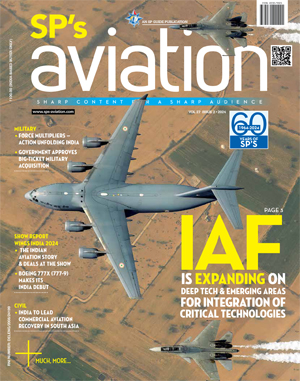INDIAN ARMED FORCES CHIEFS ON
OUR RELENTLESS AND FOCUSED PUBLISHING EFFORTS

SP Guide Publications puts forth a well compiled articulation of issues, pursuits and accomplishments of the Indian Army, over the years

I am confident that SP Guide Publications would continue to inform, inspire and influence.

My compliments to SP Guide Publications for informative and credible reportage on contemporary aerospace issues over the past six decades.
Draft Policy 2015: GA & BA Perspective
The Draft does mention government’s goal to provide level playing field to aviation subsectors, including GA/BA. However, it has missed out on some very key issues that have plagued the industry for over two decades now.

The much-awaited draft national Civil Aviation Policy (NCAP 2015) was placed in public domain on October 30, 2015. It is aimed to state government’s vision on growth of aviation sector in India for the next 10 years. In the coming weeks, the pros and cons of this draft policy would be keenly discussed amongst the stakeholders. Civil Aviation Ministry aims to come out with the final NCAP 2015 by the end of this year, after incorporating feedback from all stakeholders.
General and business aviation (GA/BA) industry, considered the nursery for the entire aviation industry, has been waiting for too long to get its due share in the new policy. The introductory part of draft NCAP 2015 does mention government’s goal to provide ecosystem and level playing field to various aviation subsectors, including general aviation. However, the subsequent parts of Draft NCAP have missed out on some very important issues that have plagued the GA/BA industry for over two decades now.
It is the time to take a leap forward and change misperceptions in certain minds on the role of GA/BA in ensuring quicker inclusive economic growth of our nation.
Roll-back of Import Duty. The growth of general and business aviation, which comprises essentially private business flying and corporate/ charter business flying, started off on a very positive note immediately after opening of Indian economy in the beginning of 1990s. The flexibility, reach and efficiency provided by GA/BA have been instrumental in inclusive economic growth of nations across the world and, the same happened to Indian economy up to the year 2006. There was no import duty on aircraft and its spares till then and, GA/BA industry grew to its potential, enabling faster inclusive growth of Indian economy. There seems to be no valid reason for imposing import duty on aircraft in 2007 for GA/BA industry. There has been no domestic GA/BA manufacturing industry to protect and, even revenue received on such imports from 2007 to 2014 has been a miniscule amount of around $20 million or less than Rs. 130 crore. This ill-conceived fiscal decision of import duty, which took GA/BA industry into deep depression, in fact, caused loss of revenue to government in terms of reduced receipt of indirect taxes that would have accrued to the exchequer through increased GA/BA operations. In the last two FYs, GA/BA industry in India has recorded negative growth. NCAP 2015, being a national agenda for growth, should have addressed this foremost issue with complete rollback of irrational import duty on GA/BA aircraft.
Infrastructure Issues of GA/BA. NCAP was expected to address the issue of separate and equitable infrastructure for GA/BA industry, especially at metro airport where demand for such operations exists at present. The issue of using provisions of ‘once in 10 years review’ in the agreements, signed with the private operators of these airports, should have been clearly stated in the NCAP 2015, as such review is due soon. Further, all the future agreements, under PPP model would adequately take care of genuine infrastructural requirements of GA/BA industry on pan-India basis, should also have been clearly stated in the NCAP.
Regulatory Bottlenecks for GA/BA Growth. GA/BA industry has been persistently demanding regulator’s recognition of aircraft management companies (AMC) as the sole means to achieve consolidation in the industry for cost-effective operations. It needs to be understood that under-utilisation of costly aviation assets would ultimately harm aviation industry and, not ensure sustainable growth of GA/BA. When such companies can prosper all over the world, especially in developed economies, there is no reason for these to be not yet recognised and allowed to operate in India. While intent to issue separate CARs, for scheduled commuter airlines (SCA) and charter operators, is a step in the right direction, it is highly unfair and unjustified not to allow SCA to undertake charter operations. We are all aware that demand for SCA is still very low and, flexible or multiple use of SCA aircraft is the only option to make such operations viable for at least 10 more years. Implementation of e-governance in DGCA is a very welcome step and would help to eliminate procedural delays, including time taken to induct new aircraft, which presently may extend to more than a year in some cases. Hopefully, the new DGCA’s CARs and the e-governance would ensure such inductions of new aircraft happen in a matter of couple of months.
Finally, the tremendous effort put in by MOCA for the Draft NACP 2015 needs to be appreciated by all. It is the time to take a leap forward and change misperceptions in certain minds on the role of GA/BA in ensuring quicker inclusive economic growth of our nation.Time for soft option of perpetuating illconceived import duty, in 2007, is fast running out, if we really wish our GDP to grow at 9 to 10 per cent, as exhorted by our able and visionary Finance Minister very recently.





